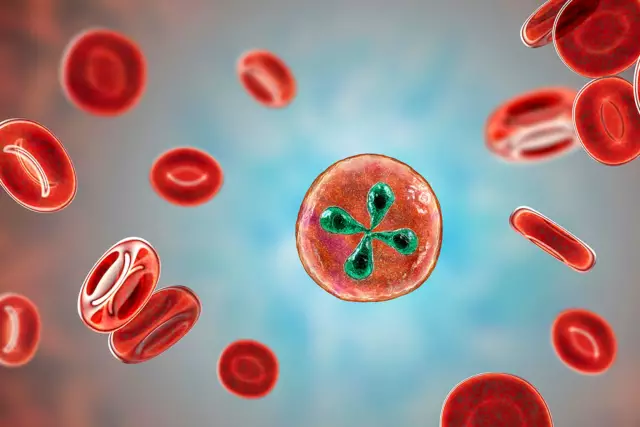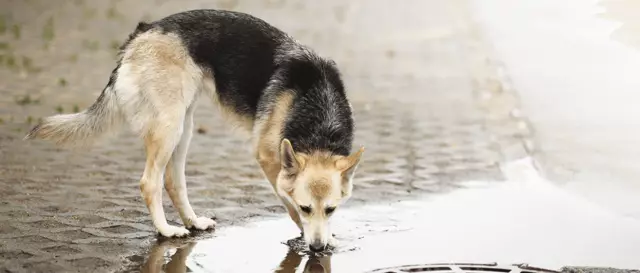- Author Rachel Wainwright wainwright@abchealthonline.com.
- Public 2023-12-15 07:39.
- Last modified 2025-11-02 20:14.
Rat poisoning
Rat poisoning is rare in humans. Typically, such poisoning occurs in children or adults as a result of a suicide attempt.

Source: depositphotos.com
How does the poisoning happen?
Zoocoumarins are anticoagulants, that is, substances that prevent blood clotting. Anticoagulants disrupt the process of the metabolism of vitamin K in the liver. Vitamin K plays an important role in the synthesis of coagulation factors VII, IX, X and prothrombin, the lack or absence of which prevents a blood clot (thrombus) from forming. All this leads to the development of hemorrhagic syndrome (massive bleeding).
Anticoagulants from rat poison are rapidly and almost completely absorbed after oral administration, their maximum plasma concentration is observed after 3 hours.
Accidental poisoning with rat poison in people is rare, since for the development of intoxication, a person must consume a sufficiently large dose of poison inside. Usually such poisoning is observed as a result of suicidal attempts or in children.
Poisoning symptoms
Signs of rat poisoning:
- intense headache;
- pallor of the mucous membranes and skin;
- nose bleed;
- bleeding from the gums;
- the appearance of blood in the urine (hematuria);
- gastrointestinal bleeding, which is manifested by vomiting of "coffee grounds", black tarry stools (with severe bleeding in the feces and vomit may be an admixture of fresh blood);
- tachycardia;
- lowering blood pressure;
- dizziness;
- severe weakness;
- apathy;
- lack of appetite.
The more severe the poisoning, the more pronounced its symptoms will be.

Source: depositphotos.com
First aid for poisoning with rat poison
The first thing to do is to call the ambulance team, and only then you should start providing first aid.
In case of poisoning, it is necessary to wash the stomach as soon as possible. This procedure allows you to remove part of the toxic substance from the body in order to prevent its further absorption and thereby reduce the severity of the hemorrhagic syndrome. For gastric lavage, the victim is given 0.5-1.5 liters of warm water to drink, after which, irritating the root of the tongue, induce vomiting. The stomach should be washed at least 2-3 times, until the washings are clear, without food particles.
To inactivate the poison that has managed to penetrate the small intestine, you should take any drug with an absorbing effect, such as activated charcoal. The dosage depends on the body weight of a person and is 1 tab. for every 10 kg. Activated charcoal should be ground into powder before use and mixed with half a glass of water.
When is medical attention needed?
Without timely medical care, one cannot expect a successful outcome, so it is necessary in any case, even if the poisoning seems frivolous.
Treatment of patients with intoxication caused by rat poison is carried out in the toxicology department of the hospital, and in critical condition - in the intensive care unit.
Specific antidotes of the anticoagulants contained in rat poison are synthetic analogs of vitamin K (Vikasol, Fitomenadion). They should be introduced for a long time, at least 10-15 days. In severe poisoning, blood transfusion and / or plasma transfusion is indicated to combat bleeding.
Symptomatic therapy is also carried out, aimed at reducing the severity of signs of poisoning and maintaining the function of the affected organs.
Possible consequences
The prognosis for rat poisoning is always serious. In case of severe intoxication, a lethal outcome is possible.
Bleeding in the urinary system can lead to a life-threatening complication - acute renal failure.
Prevention
To prevent poisoning with rat poison, you should carefully follow the instructions for its use, and also observe safety precautions not only during work, but also during storage of a toxic substance.
Keep rat poison out of the reach of children, preferably in a lockable cabinet. When working with it, you should use personal protective equipment (respirator, change of clothing, rubber gloves).
The best and safest option for controlling rodents is not to use rat poison on your own, but to call specialists in vermin.
YouTube video related to the article:

Elena Minkina Doctor anesthesiologist-resuscitator About the author
Education: graduated from the Tashkent State Medical Institute, specializing in general medicine in 1991. Repeatedly passed refresher courses.
Work experience: anesthesiologist-resuscitator of the city maternity complex, resuscitator of the hemodialysis department.
The information is generalized and provided for informational purposes only. At the first sign of illness, see your doctor. Self-medication is hazardous to health!






